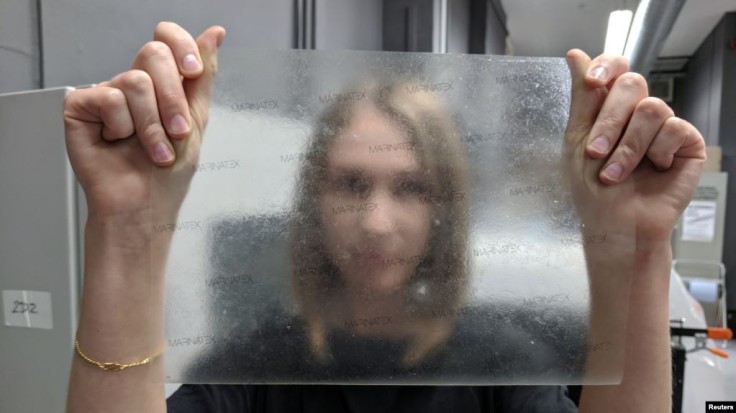Sussex University Student Wins Award for Inventing Biodegradable Plastic Made from Fish Waste
By
Lucy Hughes, a student at Sussex University, has been announced as the winner of the international James Dyson Award this year. Twickenham's 24-year-old is trying to solve the problem of single-use plastics as well as unsustainable waste sources by harnessing fish waste and creating a unique plastic substitute which she created for her Product Design course's final year project requirement.
MarinaTex is a bioplastic made of organic fish waste that is normally intended for landfill or incineration, as well as local red algae. It is a translucent and flexible sheet material that makes it ideal for single-use packaging applications.
Although it may look and feel like plastic, the similarities end there. Using a special red algae formula to bind the proteins derived from fish waste, MarinaTex has tight overlapping bonds that give it more strength and flexibility.
The material is relatively resource-light, requiring the production of low energy and temperatures below 100 degrees. After four to six weeks, it biodegrades, is ideal for home composting and does not leave toxins everywhere, eliminating the need to make facilities for national waste management.
When MarinaTex uses fishery by-products, it helps to close the loop of an existing waste stream for a longer lifetime of a more circular material. One Atlantic cod, according to Lucy, could yield as much organic waste as it is needed to make 1,400 MarinaTex bags.
Through extensive research, Lucy found fish skins and scales to form the basis of a bioplastic as they contain strong and flexible protein structures. Lucy set about finding an organic binder to allow these proteins to attach to each other to create a brand new material.
To refine the product and method, it took over 100 different experiments, most of which she performed in her student accommodation on the kitchen stove. Eventually, she produced a stable, plastic-like product she called MarinaTex, which was both biodegradable and translucent.
Lucy said that by incorporating sustainable, local and circular values into design, MarinaTex represents a commitment to material innovation and selection. She is also pleased that the James Dyson Award has recognized MarinaTex.
The invention is still in its infancy and she never thought it would make it at this stage, so she thinks it's really encouraging to have the material's potential recognized by such a prestigious award.
She added that she is pleased to have the ability to pursue more research and development to explore all of MarinaTex's possible uses, taking into account the form, feature and footprint.
This year marked the James Dyson Award's 15th year, open to student inventors with the skill and passion to solve tomorrow's problems. In all 27 participating nations, the competition also saw the largest number of female entrants in the history of the competition.
Lucy will receive £30,000 as a global recipient of the James Dyson Award, while Sussex University will receive £5,000 as well. Lucy now hopes to market her product sustainably, using her award money to further explore how MarinaTex can become a global answer to the overloading plastic waste problem while harnessing local solutions.
RELATED: Top Tea Brands Found To Contain Microplastics, Poses Serious Threat
© 2025 University Herald, All rights reserved. Do not reproduce without permission.








